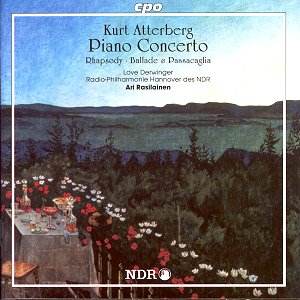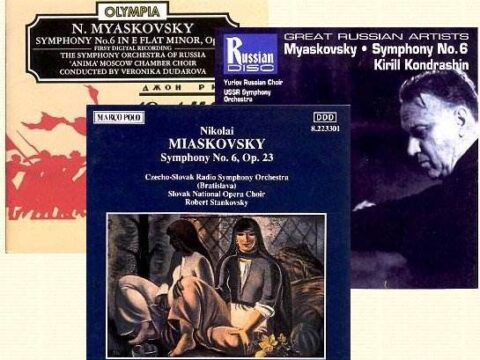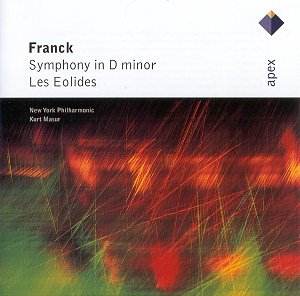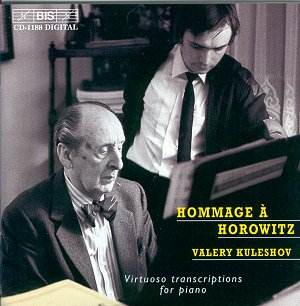 Composer: Kurt Atterberg
Composer: Kurt Atterberg
Works: Piano Concerto, Rhapsody, Ballade and Passacaglia
Performers: Löve Derwinger (piano), Radio-Philharmonie Hannover des NDR, conducted by Ari Rasilainen
Recording: 29 Feb – 3 March 2000, Grosser Sendesaal Hannover
Label: CPO
Kurt Atterberg, a notable figure in the Swedish musical landscape of the early 20th century, emerges as a composer whose works deftly bridge the gap between late Romanticism and the burgeoning modernist tendencies of his time. This recording features three of his significant compositions, showcasing his lyrical prowess and orchestral color. The Piano Concerto exudes a rich melodic fabric reminiscent of Grieg, while the Rhapsody offers early glimpses into Atterberg’s evolving style. The Ballade and Passacaglia, steeped in folk influences, exemplifies his mature voice, presenting a compelling case for Atterberg’s re-evaluation in the canon of Romantic music.
The Piano Concerto opens with an expansive melodic theme, establishing a grand narrative akin to Grieg’s own. The performance by Löve Derwinger reveals a nuanced understanding of the work’s lyrical qualities, particularly in the Andante, where the piano’s pensive bell-like motifs interplay with the orchestra’s lush strings. This moment is where Atterberg’s individuality shines through, as he juxtaposes introspective passages with Romantic opulence reminiscent of Rachmaninov. However, the finale, marked Furioso, falters slightly in its execution. The peculiar blend of folk elements and jazz influences creates an awkward tension that Derwinger and Rasilainen navigate with varying success. The orchestral forces, while well-balanced in their delivery, occasionally struggle to maintain cohesion in these more complex rhythmic sections.
Atterberg’s Rhapsody for Piano and Orchestra, his Op. 1, exhibits a youthful exuberance, traversing a wide emotional landscape. The performance captures the charm and often whimsical nature of the piece, with its shifts between grand heroism and dark introspection. The influence of Rimsky-Korsakov is palpable, particularly in the orchestral color, which is rendered beautifully by the Radio-Philharmonie Hannover. Derwinger’s command over the piano textures allows the work’s contrasting moods to flourish, although the youthful exuberance sometimes veers into a lack of restraint in the more high-spirited sections.
The Ballade and Passacaglia stands as the crowning achievement of this selection. Subtitled “On a Theme in the Swedish Folk Tone,” it unfolds like a symphonic narrative. The performance here is particularly compelling, with a vigorous opening that evokes the stormy spirit of Atterberg’s Symphony No. 3. The lyrical interlude serves as a poignant contrast, while the scherzo section delights with a playful, almost theatrical quality. This movement, with its clog dance-like rhythm, is executed with exceptional precision, showcasing the ensemble’s tightness under Rasilainen’s direction. The concluding section, imbued with Brahmsian solemnity, brings the work to a resonant close, solidifying Atterberg’s position as a composer who could balance emotion with structural integrity.
Sound quality in this recording is commendable, with a clear separation of orchestral layers that allows the listener to appreciate Atterberg’s intricate textures. The engineering captures the warmth of the orchestral sound while ensuring the piano remains prominent without overshadowing the ensemble. This is a significant consideration, particularly in works where the piano’s role is both soloistic and integrative.
Atterberg’s works, while perhaps overshadowed by more prominent contemporaries, possess a unique charm and depth. This recording not only highlights his romantic expression but also showcases the interpretative strengths of Derwinger and Rasilainen. The performances are imbued with conviction, making a persuasive case for Atterberg’s place within the late-Romantic repertoire. The CPO edition stands as a vital contribution to the ongoing rediscovery of this composer, providing listeners with a rich and rewarding experience that resonates with both nostalgia and innovation.



